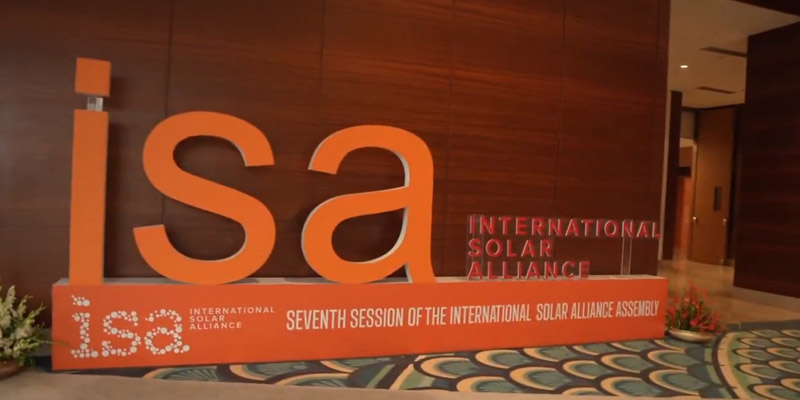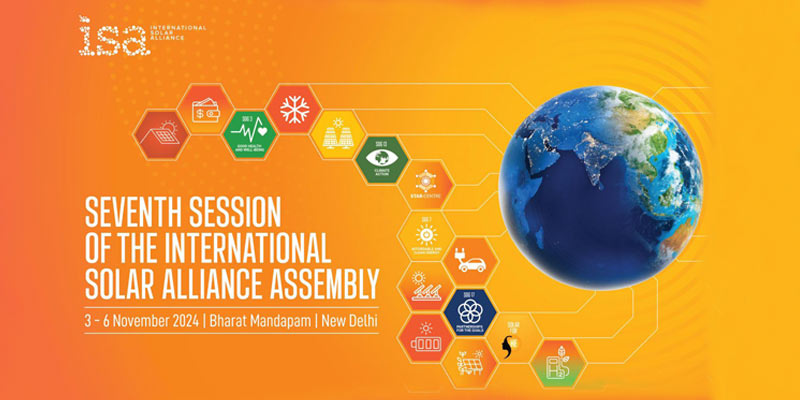- India
- Nov 08
India re-elected as president of International Solar Alliance
• India has been re-elected as the president of Indian Solar Alliance (ISA) from 2024 to 2026 during the 7th Session of the ISA Assembly, which was held in New Delhi from November 3 to 6. France has been re-elected as co-president of the ISA.
• Ashish Khanna will be the new Director General of the alliance and will assume office in March 2025, when the tenure of the incumbent Director General, Ajay Mathur, comes to a close.
International Solar Alliance
• International Solar Alliance (ISA) is an inter-governmental treaty-based organisation with a global mandate to catalyse solar growth by helping to reduce the cost of financing and technology.
• The ISA was jointly launched by Prime Minister Narendra Modi and French President Francois Hollande on November 30, 2015, in Paris on the sidelines of the 21st Conference of Parties (COP21) to the UNFCCC.
• The ISA Framework Agreement was opened for signature on November 15, 2016, in Marrakech, Morocco, on the sidelines of COP22.
• With the signing and ratification of the ISA Framework Agreement by 15 countries on December 6, 2017, ISA became the first international inter-governmental organisation to be headquartered in India.
• On March 11, 2018, Modi and French President Emmanuel Macron co-hosted the founding conference of the International Solar Alliance (ISA).
• Membership is open to those solar resource-rich states that lie fully or partially between the Tropic of Cancer and the Tropic of Capricorn, and are members of the UN.
• ISA was conceived as a coalition of solar-resource-rich countries (which lie either completely or partly between the Tropic of Cancer and the Tropic of Capricorn) to address their special energy needs.
• The vision and mission of the ISA is to provide a dedicated platform for cooperation among solar-resource-rich countries, through which the global community, including governments, bilateral and multilateral organisations, corporates, industry, and other stakeholders, can contribute to help achieve the common goal of increasing the use and quality of solar energy in meeting energy needs of prospective ISA member countries in a safe, convenient, affordable, equitable and sustainable manner.
• At present, 120 countries are signatories to the ISA Framework Agreement, of which 100 countries have submitted the necessary instruments of ratification to become full members of the ISA.
• ISA has been positioned to help create the conditions that would make funding, developing and deploying solar applications on a large scale a reality.
• ISA is now perceived as key to achieving the 2030 Sustainable Development Goals and objectives of the Paris Agreement on Climate Change.
• ISA is partnering with multilateral development banks (MDBs), development financial institutions (DFIs), private and public sector organisations, civil society, and other international institutions to deploy cost-effective and transformational solutions through solar energy, especially in the least Developed Countries (LDCs) and the Small Island Developing States (SIDS).
Objectives of ISA:
• To address obstacles that stand in the way of rapid and massive scale-up of solar energy.
• To undertake innovative and concerted efforts for reducing the cost of finance and cost of technology for immediate deployment of competitive solar generation.
• To mobilise more than $1,000 billion of investments by 2030.
• Reduce the cost of finance to increase investments in solar energy in member countries by promoting innovative financial mechanisms and mobilising finance from institutions.
• Scale up applications of solar technologies in member countries.
• Facilitate collaborative research and development (R&D) activities in solar energy technologies among member countries.
• Promote a common cyber platform for networking, cooperation and exchange of ideas among member countries.
Assembly of the ISA
• The Assembly of the ISA is the apex decision-making body which deliberates on critical matters like ISA objectives, its functioning, approval of operating budget, assessment of the implementation of various initiatives, programmes and activities of ISA and others.
• The First Assembly of the ISA, held on October 3, 2018, adopted the amendment to the Framework Agreement to expand the scope of ISA membership to all member countries of the United Nations.
• The Assembly meets annually at the ministerial level at the ISA’s seat.
Highlights of the 7th Session of ISA Assembly:
• It focused on accelerating solar energy deployment across its Member Countries, particularly in regions with limited energy access.
• Several significant initiatives, programmes, and funding schemes aimed at supporting solar energy projects and fostering global cooperation were presented and discussed.
• The ISA launched several key initiatives to advance global solar energy adoption. The SolarX Startup Challenge, introduced at COP27, supported innovative solar businesses in ISA Member Countries.
• The STAR-C Initiative strengthened solar technology skills in developing economies, while the Global Solar Facility catalysed investment in underserved regions, particularly Africa.
• The Viability Gap Funding Scheme provided grants to solar projects in Least Developed Countries and Small Island Developing States, easing financial barriers.
• The Solar Data Portal offered real-time data to inform investment decisions, and the International Solar Festival fostered global collaboration on solar solutions.
• Additionally, the Green Hydrogen Innovation Centre explored synergies between solar energy and hydrogen, and the ISA Knowledge Series and World Solar Reports promoted research, insights, and market trends, positioning ISA as a leading advocate for solar energy worldwide.
Election of vice presidents of the Standing Committee
Eight vice presidents of the Standing Committee, two from each of the four ISA geographical regions, were also selected by the Assembly.
• From the Africa Region, Ghana and Seychelles have been selected as the vice presidents, while South Sudan and the Comoros will support the vice presidents as vice-chairs of Africa.
• From the Asia and the Pacific Region, Australia and Sri Lanka have been selected as vice presidents, with the United Arab Emirates and Papua New Guinea as the vice-chairs.
• Germany and Italy have been selected as vice presidents from the Europe and the Others Region, along with Greece and Norway as vice-chair.
• Leading the Regional Committee of the Latin America and the Caribbean region will be Grenada and Suriname, Jamaica and Haiti as vice-chairs.
Manorama Yearbook app is now available on Google Play Store and iOS App Store



